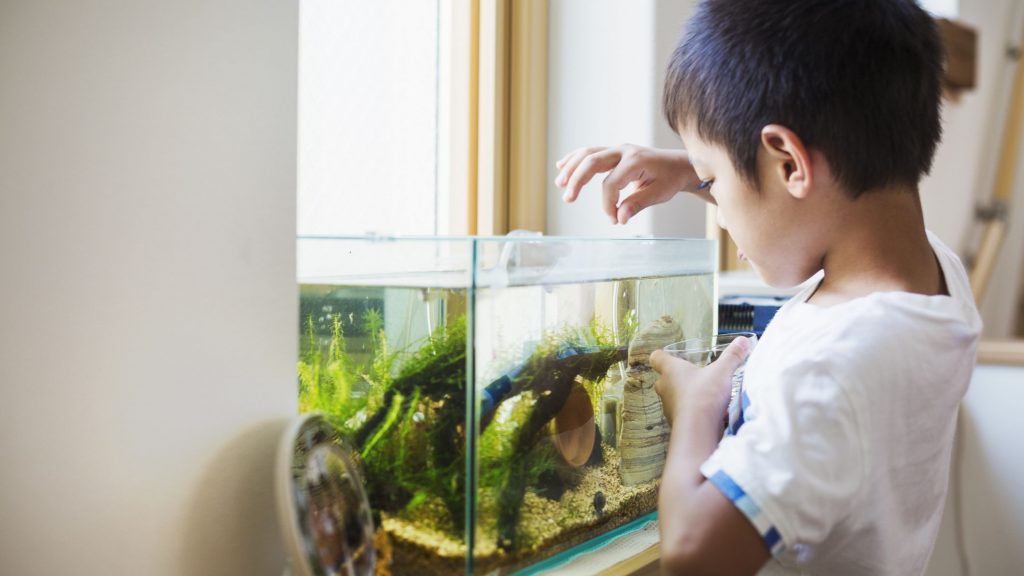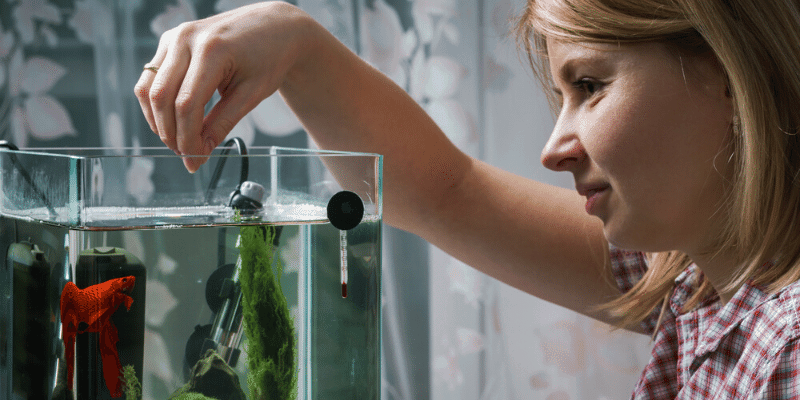How long can fish live without food? Oooh, the sixty-four million dollar question. Is it possible for you to leave them for a few weeks while you go on vacation? Is it possible for you to leave fish for the weekend? Or do they require nourishment daily to maintain their health?

Let’s see what we can find out!
Food, what delicious food!
Fish, like many other organisms, enjoy food and will take advantage of every opportunity to consume it. They will eat everything, including large meals, tiny meals, treats, aquatic plants, and even other aquarium fish.
Food is one of the most essential things in their lives; they become excited at the sight of it, fight for it, and may even beg for it.
The truth is that what appears to be hunger, verging on obsession, is just a survival drive. When given the opportunity, they will eat a lot. This is a natural tendency that they have inherited from their natural environment.
Take, for example, the Angelfish, an omnivore that primarily eats insects and crustaceans. In their natural environment, they do not always have a consistent supply of food. Moreover, must rely on opportunities to feed when they arise.

This feeding frenzy behavior in the home aquarium has led to the misconception that fish require a large amount of food daily. This isn’t entirely accurate, but it has led to many aquarists overfeeding and stressing if they miss even one day’s feed.
So, what is the maximum amount of time a fish can go without food?
Trying to guess how long a fish can go without food is akin to guessing the length of a piece of string. The answer will differ based on the individual fish or piece of string in question; there is no such thing as a “one-size-fits-all” solution!
Most tropical fish, in general, have a surprising ability to fast and survive. Almost all species can spend at least a few days without being fed, and some, such as Cichlids, can go up to ten days without being eaten.
Larger, older fish will do better without food than smaller, younger fish. Herbivores who eat daily will suffer more than carnivores who eat just once or twice a week. When left unfed, the fish fry is the most vulnerable. These young fish will barely live for a day or two.
What will I do if I don’t know how long my fish can survive without food?
To be honest, there’s no way to know unless you put them to the test by not feeding them and watching how they react. This, however, is not something we encourage because it may be harmful to your fish’s health, if not fatal.

Rather, we recommend that you only leave your fish without food for three to four days if necessary, However, you take a few steps to reduce their appetites.
The first thing you can do to reduce your fish’s appetite is to lower the aquarium’s temperature somewhat. The second step is to reduce the amount of time your aquarium lights are turned on.
These steps will reduce the amount of activity your fish engages in, slow down their metabolism, and reduce their need for food.
Also see – How To Increase Oxygen In a Fish Tank?
How Can I Feed My Fish During a Vacation?
If you’re going on a longer vacation, ensure sure your fish are taken care of while you’re gone. Here are some of the most common methods for ensuring that your fish do not go hungry!
1. Automatic Fish Feeders
In this circumstance, automatic fish feeders are my preferred tool. These machines have a hopper that stores cooked items and may be configured to distribute as much or as little as you want.
I strongly recommend having an automated feeder on hand a few days before your travel so you may test it and ensure it functions properly. Some machines can only dispense a single type of prepared food (for example, only flakes or pellets), so choose wisely.

The Torlam is a more versatile model with more options for operational flexibility. It can be programmed to feed twice or three times a day depending on the time of day. You can program one to drop a small, single meal of pellets for your plecos at night but a triple feeding for the community at noon, for example.
When you get home, you can leave the device installed but use the manual override button to feed your fish yourself. Should you be called away on business, the Torlam Auto Feeder will continue to administer food as usual.
2. Fish Sitters
Another typical technique to ensure that your fish eat properly is to have a neighbor, family, or friend drop over and feed them.
Fish sitters can also perform tasks that automatic feeders cannot. Such as removing a fish that has died during your trip so that it does not rot and cause other problems. Alternatively, we can phone you to provide updates, send tank photographs, and more.

It makes me feel better if my fish sitter knows anything about aquariums. So being a member of a local aquarium club or having a companion who knows fish is beneficial! Unacquainted people may underfeed or, even worse, overfeed their fish.
A skilled fish sitter may also conduct pH and ammonia tests, as well as administer medications to a sick fish.
Green aquarium water, nasty odors, fungus-covered food, and ich are among the worst things to return to after a long vacation. So pick your fish sitter wisely!
3. Food Blocks
Food blocks, despite their unusual appearance, have been around for decades and are a cheap and simple way to keep your fish happy. They can endure for weeks and don’t require any calibration or instructions to use!
These goods are adequate for vacation feeding. They’re the simplest way to keep your fish fed while you’re on the road. However, I do not use these and would advise caution if you chose to purchase one for several reasons.

Mineralized blocks of vegetable and animal protein make up food blocks. The mineral powder reduces the rate at which nutrients are released into the water. While this is an excellent concept, the issue is that the release is continuous.
The breakdown process continues once your fish cease eating. Manufacturers attempt to counteract this by lowering nutritious content, which is understandable. Except now we’re just feeding our fish low-quality food. It’s an improvement over nothing, but it’s far from great.
Furthermore, many fish will misinterpret these blocks as food. Much communal fish, such as Guppies and Barbs, are quite adaptable and will eat just about anything.
We’ve discovered that fish can go anywhere from three to seven days without feeding before becoming ill. And that the precise range is determined by their body temperature, size, metabolism, and food.
If you’re going on a trip longer than 2-3 days, instead of testing this, use one of the three ways outlined above to keep your fish supplied. So, good luck on your journey, and may your fish be well nourished in the meanwhile!

